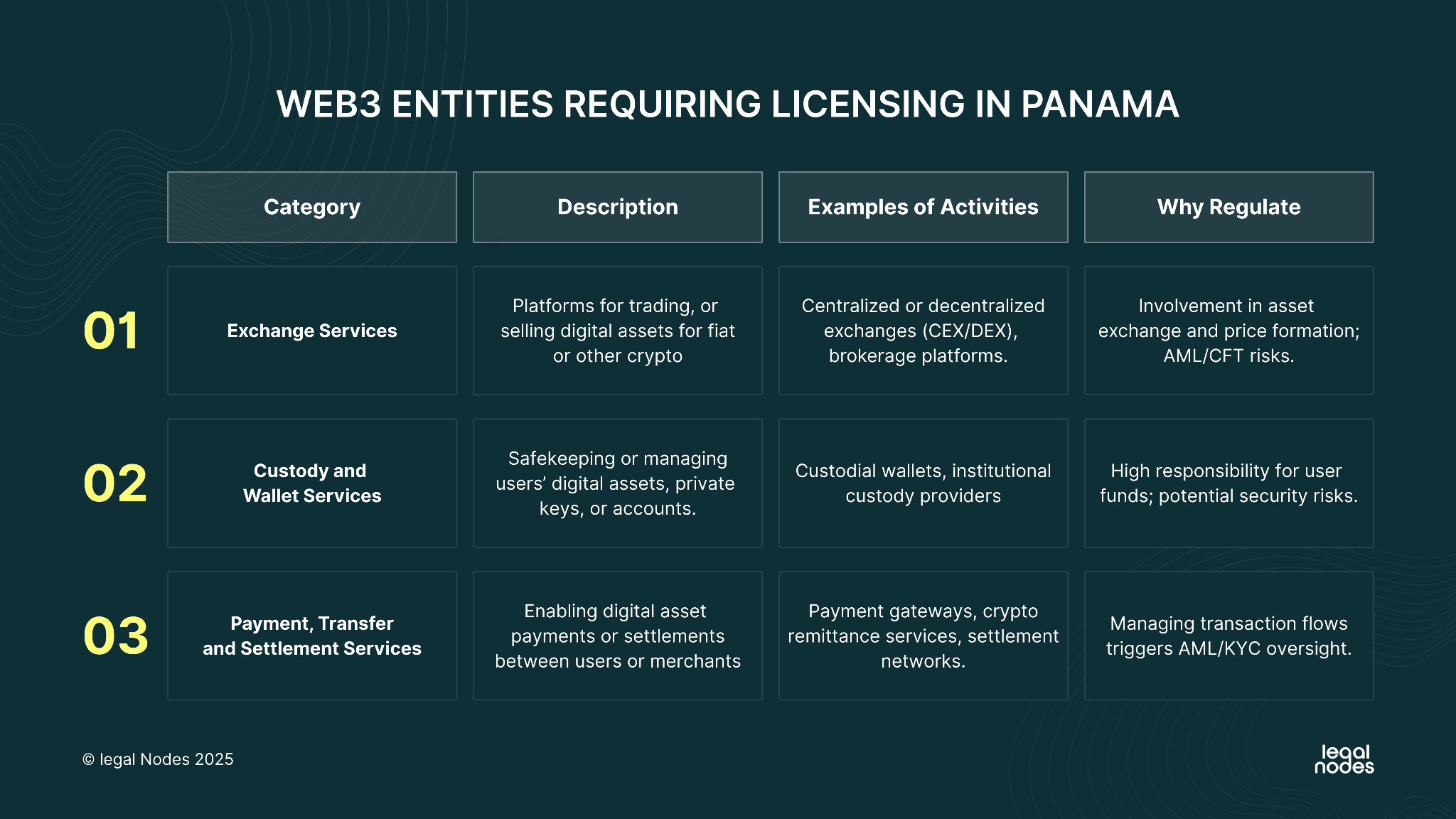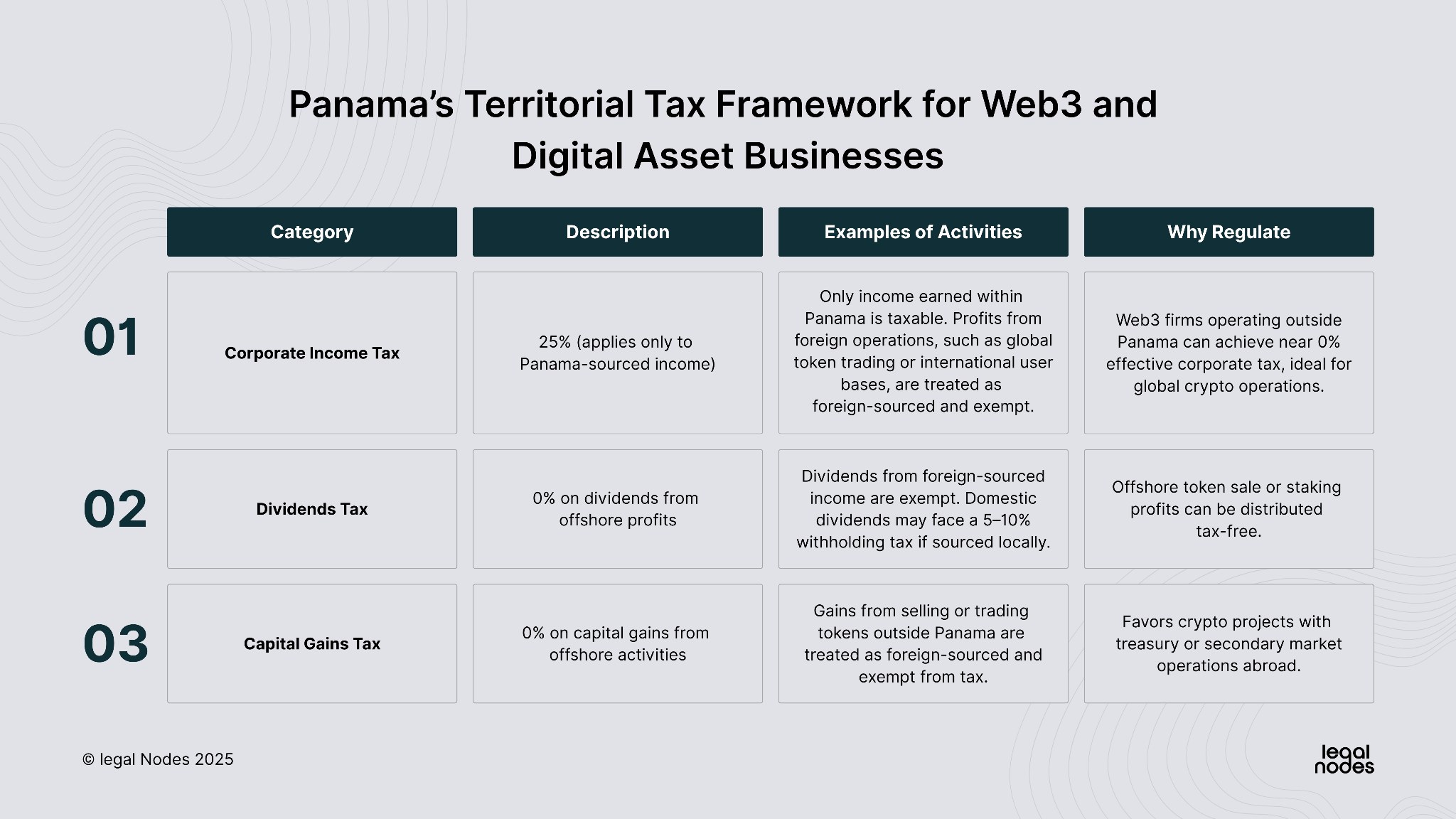Over the past few years, Panama has quietly transformed from a regional financial hub into one of the most closely watched crypto jurisdictions in the world. Strategically positioned at the crossroads of North and South America, the country is now setting its sights on becoming a gateway for global digital asset innovation.
The latest legislative initiative — Bill No. 247, introduced in 2025 — seeks to address Panama’s current lack of a comprehensive legal framework for cryptocurrencies and Virtual Asset Service Provider (VASPs) by establishing a dedicated regulatory regime for digital assets and VASP activities. However, the bill is still under discussion in the National Assembly and has not yet been enacted into law.
For Web3 founders and companies, understanding how Bill No. 247 could reshape the regulatory landscape— and how the current regime functions in its absence — is essential when considering expansion, licensing, or token issuance in one of the most strategically positioned jurisdictions in the Americas.
From Bill 697 to Bill 247: Lessons Learned from a Regulatory False Start
Panama’s first serious attempt at regulating cryptocurrency came in 2021 with Bill No. 697, a wide-ranging proposal designed to integrate digital assets into the local economy.
The bill aimed to provide legal recognition for cryptocurrencies, regulate their use in commerce, and set out a preliminary framework for virtual asset businesses. It was approved by the National Assembly in April 2022 but met resistance at the highest political level: President Laurentino Cortizo vetoed the bill just two months later, citing serious concerns over anti-money laundering (AML) compliance, regulatory oversight, and constitutional conflicts.
However, the experience proved instructive. Lawmakers, regulators, and industry advocates recognised that a successful regulatory framework would require more than enthusiasm for innovation — it needed to meet FATF international standards, offer tax clarity, ensure consumer protection, and create effective institutional coordination.
The Principle of Monetary Freedom: A Unique Starting Point
Panama’s regulatory approach to cryptocurrencies is shaped by a unique constitutional feature: Monetary Freedom. Enshrined in Article 262 of the Constitution, it prohibits compulsory legal tender and allows all currencies — including foreign ones — to circulate freely. Since 1904, this has enabled the US dollar to function as legal tender alongside the Panamanian balboa.
This constitutional principle creates a fundamentally different legal foundation from countries that must amend monetary policy to integrate cryptocurrencies. In Panama, there is no need for a legislative declaration making Bitcoin or other digital assets “legal tender” — they can already be used in transactions by mutual agreement. This provides a strong base for a regulatory framework focused on recognition, oversight, and compliance rather than monetary redefinition.
Bill No. 247: A Comprehensive Redesign
Introduced in 2025, Bill No. 247 represents a more sophisticated and robust attempt to regulate digital assets in Panama. This new legislative proposal directly addresses the shortcomings of Bill 697 and reflects lessons learned from both domestic challenges and global regulatory trends.
If enacted in its current form, Bill No. 247 would introduce several notable features, including:
- FATF alignment: the planned incorporation of the Financial Action Task Force’s 40 recommendations on anti-money laundering (AML) and counter-terrorist financing (CFT).
- Licensing regime: mandatory registration and licensing requirements for Virtual Asset Service Providers (VASPs). All entities providing crypto-related services must register and comply with legal, operational, and financial requirements.
- Legal recognition: the draft contemplates explicit legal acknowledgement of crypto as a valid medium of exchange when agreed by parties.
- Phased implementation: a framework for gradual regulatory rollout intended to balance innovation with compliance certainty. Existing operators may be granted a transitional period to register and comply.
In addition to regulating digital assets, the draft bill also proposes exploring the use of blockchain technology for various public-sector applications, such as digital identity, tokenized securities, and legally enforceable smart contracts.
For founders, this means a more stable and predictable environment for launching digital asset services — one that promises legal clarity, institutional support, and a forward-looking regulatory approach.
A Comprehensive Licensing Regime for Virtual Asset Businesses
The central concept introduced by the bill is the Virtual Asset Service Provider — a category that covers any entity involved in issuing, transferring, exchanging, storing, or otherwise dealing with digital assets on behalf of others. Every VASP would be required to register, obtain a license and comply with strict AML and know-your-customer (KYC) obligations aligned with the FATF recommendations.
Who Needs a License?
Under the proposed law, “Virtual Asset Service Provider” is defined broadly to include any entity engaged in the issuance, exchange, transfer, custody, or other operations with digital assets on behalf of third parties.
If enacted, the law would require registration for a wide range of activities, including:
- Exchanges: platforms enabling crypto-to-fiat or crypto-to-crypto trading.
- Custodians and wallet providers: entities safeguarding digital assets, private keys, or user account access.
- Payment gateways and settlement services: companies facilitating payments, transfers, or settlements in digital assets.
Operating without a valid license in any of these categories is expected to be prohibited if the bill passes and may lead to potential penalties.

While the bill outlines mandatory registration for VASPs with the relevant regulatory authority, it does not yet establish detailed categories of licenses or final compliance obligations. These specifics — such as reporting standards, operational controls, or technical safeguards — are expected to be defined in secondary regulations once the law is enacted.
Compliance Obligations After Licensing
Obtaining a license is only the first step. Licensed VASPs may be required to comply with a series of ongoing obligations designed to maintain transparency, prevent financial crime, and ensure operational integrity, such as, potentially:
- AML/CFT and KYC Compliance: Establish and maintain comprehensive AML and CFT frameworks that comply with the 40 FATF Recommendations.
- Regular Reporting: Submit periodic financial statements, compliance reports, and audit results.
- Transaction Monitoring: Implement systems to detect high-risk activity and unusual transaction patterns in real time.
- Risk Management: Conduct annual risk assessments, update policies, and maintain internal training programs for staff.
- Record Keeping: Retain customer and transaction records for at least five years.
These requirements are not yet codified in law but are expected to be addressed in secondary regulations and may follow FATF best practices.
Market Opportunities: Tokenisation, Real Estate, and Fintech
The new legal environment is expected to catalyse growth across several segments of the digital economy:
- Tokenisation of assets: With the potential for clearer rules on digital securities in future regulations, companies can tokenize commodities, real estate, and financial instruments — tapping into new investment models.
- Real estate and property tech: The potential for blockchain-based property registries and crypto-based transactions could transform Panama’s real estate sector, attracting foreign investors and expats.
- Fintech expansion: Low-cost company formation, tax incentives, and a supportive regulatory framework make Panama a strong launchpad for fintech and digital asset startups targeting Latin America.
Why Panama Is Emerging as a Web3 Destination
Panama’s regulatory reforms are not just about compliance — they are designed to position the country as a competitive, business-friendly jurisdiction for Web3 companies and digital asset innovation. By combining favourable tax policies, global banking connectivity, and regulatory direction, Panama aims to become a regional hub for blockchain projects, exchanges, and token

For founders and investors, this unique blend of legal structure and commercial opportunity makes Panama an attractive jurisdiction for launching or expanding a crypto business.
Territorial Taxation and Crypto-Friendly Fiscal Policy
One of Panama’s most significant advantages is its territorial tax regime. Under current law, only income generated within Panama’s borders is subject to corporate income tax. Revenue earned from foreign sources — including activities conducted entirely outside Panama — generally falls outside the scope of Panamanian taxation.
This principle can apply to digital asset businesses as well, meaning that profits from activities such as global token trading, staking, or issuance to non-Panamanian users may be treated as foreign-sourced and therefore exempt.

This territorial tax approach offers substantial flexibility for Web3 companies serving international clients or managing global liquidity. Nevertheless, because crypto-specific tax rules are still developing, it is critical to seek jurisdiction-specific advice on transaction structuring, revenue sourcing, and compliance before launch.
Strategic Positioning: Gateway to the Americas
Geographically, Panama’s location is another key asset. Serving as a logistical and financial bridge between North and South America, the country offers companies a strategic base from which to access major markets across the Americas and the Caribbean.
Combined with fast company incorporation processes (often completed within 1–2 weeks) and no physical presence requirements, Panama’s business environment is ideal for remote-first Web3 teams and global token projects.
Challenges and Strategic Considerations
Despite its advantages, Panama’s regulatory landscape is still evolving. While Bill 247 is a major step forward, there is still no single, comprehensive law covering all aspects of the crypto ecosystem. As Panama continues refining its regulatory framework, companies must remain agile and invest in continuous legal and compliance monitoring.
Working with local legal advisors and compliance experts is essential to navigating these challenges and ensuring that projects remain aligned with evolving laws. At Legal Nodes, we help Web3 founders navigate fast-changing legal landscape with confidence — from company formation and VASP licensing to token issuance and ongoing compliance.
FAQ
Do I need a physical office in Panama?
No physical office is required for basic company incorporation. You must have a registered legal address in Panama, but incorporation and compliance procedures can all be completed remotely. However, licensing may require a compliance officer, local reporting representative, or other substance elements.
Are there residency or citizenship requirements for founders or directors?
No. Panama imposes no residency or nationality restrictions on shareholders, directors, or founders. Both locals and foreign nationals can fully own, manage, and operate businesses registered in the country.
Do I need staff or employees physically present in Panama?
No. Most crypto businesses operate without a physical workforce in Panama. All incorporation, licensing, and compliance procedures can be completed remotely.
How to navigate the complex landscape of VASP regulations with confidence?
In today's rapidly evolving crypto ecosystem, new business models are constantly emerging worldwide. These innovative ventures must navigate a complex web of regulations, including financial laws, securities regulations, consumer protection measures, and VASP-specific legislation.
Legal Nodes offers comprehensive support to help you navigate this landscape:
- Operate legally as a VASP: Our team guides you through obtaining necessary licenses and authorizations.
- Stay compliant with relevant laws: We assist in identifying and adhering to regulations specific to your crypto business model.
- Maintain ongoing regulatory adherence: We help implement robust compliance procedures to ensure your business stays up-to-date with requirements.
Additionally, we provide specialized services tailored to the unique needs of crypto and web3 projects. Explore some of our playbooks and guides below to learn more:
- Ensuring compliance with VASP requirements for token issuance
- Legal guidance on web3 protocol interface compliance
- Developing comprehensive legal strategies for token projects
- Creating holistic legal frameworks for Web3 ventures
Ilona is a legal specialist at the forefront of tech & Web3 regulation. Passionate about the intersection of law and tech, she has collaborated on AI systems (general & legal) development and launched her charity NFT project. Ilona holds degrees and certifications from different universities, providing a global perspective to her practice.
